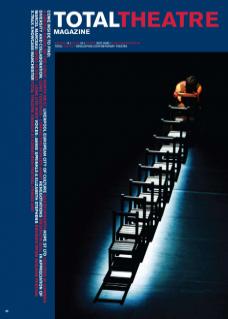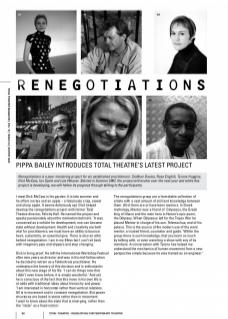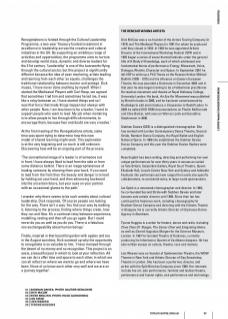I meet Dick McCaw in his garden. It is late summer and he offers me tea and an apple – a fabulously crisp, sweet and sharp apple. It seems deliciously apt. Dick helped develop the renegotiations project with former Total Theatre director, Felicity Hall. He named the project and speaks passionately about the motivation behind it. ‘It was conceived as a vehicle for development; one can become stale without development. Health and creativity are both vital for practitioners; we must have an ability to bounce back, a plasticity, an essential give. There is also an ethic behind renegotiation. I am in my fifties but I can’t sit back with imaginary pipe and slippers and stop changing.’
Dick is living proof. He left the International Workshop Festival after nine years as director and was in his mid-forties when he decided to retrain as a Feldenkrais practitioner. He underplays the bravery of this decision and is enthusiastic about this new stage of his life. ‘I can do things now that I didn’t even know before, it is simply wonderful.’ And yet he is conscious of the fact that this move in his own life is at odds with traditional ideas about hierarchy and power. ‘I am interested in horizontal rather than vertical relations. All is in movement and in constant renegotiation. But power structures are based in stasis rather than in movement. I want to know about the state that is emerging, rather than the “state” as a fixed notion.’
The renegotiations group are a formidable collection of artists with a vast amount of skill and knowledge between them. All of them are or have been mentors. In Greek mythology, Mentor was a friend of Odysseus, the Greek king of Ithaca and the main hero in Homer’s epic poem, the Odyssey. When Odysseus left for the Trojan War he placed Mentor in charge of his son, Telemachus, and of his palace. This is the source of the modern use of the word mentor: a trusted friend, counselor and guide. ‘Within the group there is such knowledge, that you learn so much by talking with, or even watching a show with any of its members. A conversation with Tyrone has helped me understand the mechanics of human movement from a new perspective simply because he was trained as an engineer.
Renegotiations is funded through the Cultural Leadership Programme, a two-year Treasury funded investment in excellence in leadership across the creative and cultural industries in the UK. By supporting an ambitious range of activities and opportunities, the programme aims to nurture and develop world class, dynamic and diverse leaders for the 21st century. ‘Leadership’ is one of the buzzwords flying through the cultural sector, but this project is significantly different because the idea of peer mentoring, artists leading and learning from each other as equals, challenges the traditional relationship between mentor and protégé. Dick muses, ‘I have never done anything by myself. When I started the Mediaeval Players with Carl Heap, we agreed that sometimes I led him and sometimes he led me, it was like a relay between us. I have started things and so I was that force that made things happen but always with other people. Now, I am less keen to be a leader, I want to support people who want to lead. My job when mentoring is to allow people to live through difficult moments, to encourage them, because fear and doubt are very creative.’
At the first meeting of the Renegotiations artists, some time was spent trying to determine how this new model of shared learning might work. This exploration is at the very beginning and so much is still unknown. Discovering how will be an ongoing part of the process.
‘The conventional image of a leader is of someone out in front. I have always liked to lead from the side or from some distance behind. There is an inappropriateness of leading someone by showing them your back. If you want to lead from the front then the beauty and danger is to lead by holding out your hand, and then advancing backward into the uncertain future, but your eyes on your partner with an occasional glance to the path.’
I wonder why there seems to be such anxiety about cultural leadership. Dick responds, ‘Of course people are looking for the way. There isn’t a way. You find your way by walking it, listening to the process, finding where things creak, how they run and flow. It’s a continual relay between experience, modelling, testing and then off you go again. But I could never do you as well as you do you. There is a fabulous non exchangeability about human beings.’
Finally, inspired in that beautiful garden with apples and tea in the August sunshine, Dick summed up why the opportunity to renegotiate is so valuable to him, ‘I have tramped through the desert of no money and no recognition. This project is an oasis, a beautiful pool in which to look at your reflection. All we can do is offer time and space to each other, in which we can all reflect on where we want to go and where we have been. None of us know each other very well and we are on a journey together’.
THE RENEGOTIATIONS ARTISTS
Dick McCaw was a co-founder of the Actors Touring Company (in 1979) and The Medieval Players (in 1981) for whom he produced until they closed in 1992. In 1993 he was appointed Artistic Director of the International Workshop Festival (IWF) and in 1995 began a series of seven themed festivals under the general title of A Body of Knowledge, each of which addressed one fundamental theme of performance: Energy, Movement, Voice, Dialogue, Rhythm, Character and Space. In September 2001 he left IWF to write up a PhD Thesis on the Russian thinker Mikhail Bakhtin (1895 - 1975) and his influence on Eastern European Theatre. He was awarded a Doctorate in December 2003 and in that year he also began training to be a Feldenkrais practitioner. He teaches movement and theatre at Royal Holloway College, University London. His book, An Eye For Movement was published by Brechin books in 2006, and he has been commissioned by Routledge to edit and introduce a Companion to Rudolf Laban. In 2005 he edited DVD ROM documentations on Phelim McDermott and Clive Barker, with ones on Warren Lamb and Geraldine Stephenson in 2006.
Siobhan Davies (CBE) is a distinguished choreographer. She has worked with London Contemporary Dance Theatre, Second Stride, Rambert Dance Company, the Royal Ballet and English National Opera. In 1988 she established the Siobhan Davies Dance Company and this year the Siobhan Davies Studios were completed.
Rose English has been writing, directing and performing her own unique performances for over thirty years in venues as varied as Tate Britain, Serpentine Gallery, Royal Court Theatre, Queen Elizabeth Hall, Lincoln Centre New York and Sydney and Adelaide Festivals. Her performances have ranged from early site-specific collaborations, to acclaimed solos, to large-scale spectaculars.
Ian Spink is a renowned choreographer and director. In 1982, he co-founded Second Stride with Siobhan Davies and later became sole artistic director until 1996. Since then Ian has continued his freelance work, including choreography for Rambert Dance Company and directing with the Citizens Theatre in Glasgow. He is currently Artistic Director of Citymoves Dance Agency in Aberdeen.
Tyrone Huggins is a writer for theatre, dance and radio, including Choo Choo Ch’ Boogie, The Carver Chair and Emigrating Home; as well as Garrett Augustus Morgan for the Science Museum, London. In 1987 he founded Theatre of Darkness, currently producing his Inheritance Quartet of Caribbean diaspora. He has also written essays on culture, theatre, race and memory.
Lois Weaver was co-founder of Spiderwoman Theatre, the WOW Theatre in New York and Artistic Director of Gay Sweatshop Theatre in London. She has been a performer, director, and writer with the Split Britches Company since 1980. Her interests include live art, solo performance, feminist and lesbian theatre, performance and human rights, and performance and technology.


